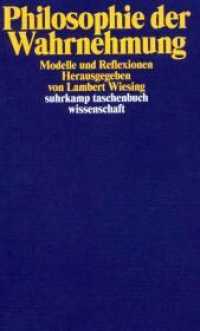- ホーム
- > 洋書
- > 英文書
- > Religion / Ethics
Full Description
A critical addition to Dante studies that illuminates the poet's disruptive impact within Italian culture and foregrounds Barolini's marked contribution to the field.
In Dante's Multitudes, the newest addition to the renowned William and Katherine Devers Series in Dante and Medieval Italian Literature, Teodolinda Barolini gathers sixteen of her essays exploring the revolutionary character of Dante's work. Embracing the Vita Nuova, De vulgari eloquentia, Convivio, Epistles, Monarchia, and Rime, and of course the Divine Comedy, these essays together feature the many facets of the poet's enduring legacy.
Dante's Multitudes showcases the poet's embrace of multiplicity, difference, and disruption in five parts, each with its own general focus. It begins with an introductory essay on method and the use of history in order to set the stage for the expert analyses that follow. Barolini treats various topics in Dante studies, including sexualized and racialized others in the Comedy, Dante's unorthodox conception of limbo, his celebration of metaphysical difference within the paradoxical unity of the Paradiso, and his use of Aristotle to think disruptively about wealth and society, on the one hand, and about love and compulsion, on the other. The volume closes with a final meditation on method and "critical philology," highlighting the ways in which philology has been used uncritically to bolster fallacious hermeneutical narratives about one of the West's most celebrated and influential poets. Barolini once again opens avenues for further research in this compelling collection of essays. This volume will be of interest to scholars in Dante studies, Italian studies, and medieval and Renaissance literature more broadly.
Contents
Note on Editions and Translations
Preface
Part I. Social and Cultural Difference
1. "Only Historicize": History, Material Culture (Food, Clothes, Books), and the Future of Dante Studies
2. Dante's Sympathy for the Other, or the Non-Stereotyping Imagination: Sexual and Racialized Others in the Commedia
3. Contemporaries Who Found Heterodoxy in Dante: Cecco d'Ascoli, Boccaccio, and Benvenuto da Imola on Fortuna and Inferno 7.89
4. Dante's Limbo and Equity of Access: Non-Christians, Children, and Criteria of Inclusion and Exclusion, from Inferno 4 to Paradiso 32
Part II. Metaphysical Difference
5. Toward a Dantean Theology of Eros: From Dante's Lyrics to the Paradiso
6. Amicus eius: Dante and the Semantics of Friendship
7. Paradiso and the Mimesis of Ideas: Realism versus Reality
8. Dante Squares the Circle: Textual and Philosophical Affinities of Monarchia and Paradiso (Solutio Distinctiva in Mon. 3.4.17 and Par. 4.94-114)
9. Difference as Punishment or Difference as Pleasure: From the Tower of Babel in De vulgari eloquentia to the Death of Babel in Paradiso 26
Part III. Aristotelian Disruptions 1: Wealth and Society
10. Aristotle's Mezzo, Courtly Misura, and Dante's Canzone Le dolci rime: Humanism, Ethics, and Social Anxiety
11. Dante and Wealth, Between Aristotle and Cortesia: From the Moral Canzoni Le dolci rime and Poscia ch'Amor through Convivio to Inferno 6 and 7
Part IV. Aristotelian Disruptions 2: Love and Compulsion
12. Archeology of the Donna Gentile: The Importance of Disconversion in Conversion Narratives
13. Dante and Cecco d'Ascoli on Love and Compulsion: The Epistle to Cino, Io sono stato, the Third Heaven
14. Voi che 'ntendendo il terzo ciel movete, A Dramatization of "utrum de passione in passionem possit anima transformari": Conflict, Compulsion, Consent, Conversion
Part V. Critical Philology and Italian Cultural History
15. The Case of the Lost Original Ending of Dante's Vita Nuova: More Notes Toward a Critical Philology
16. Critical Philology and Dante's Rime








